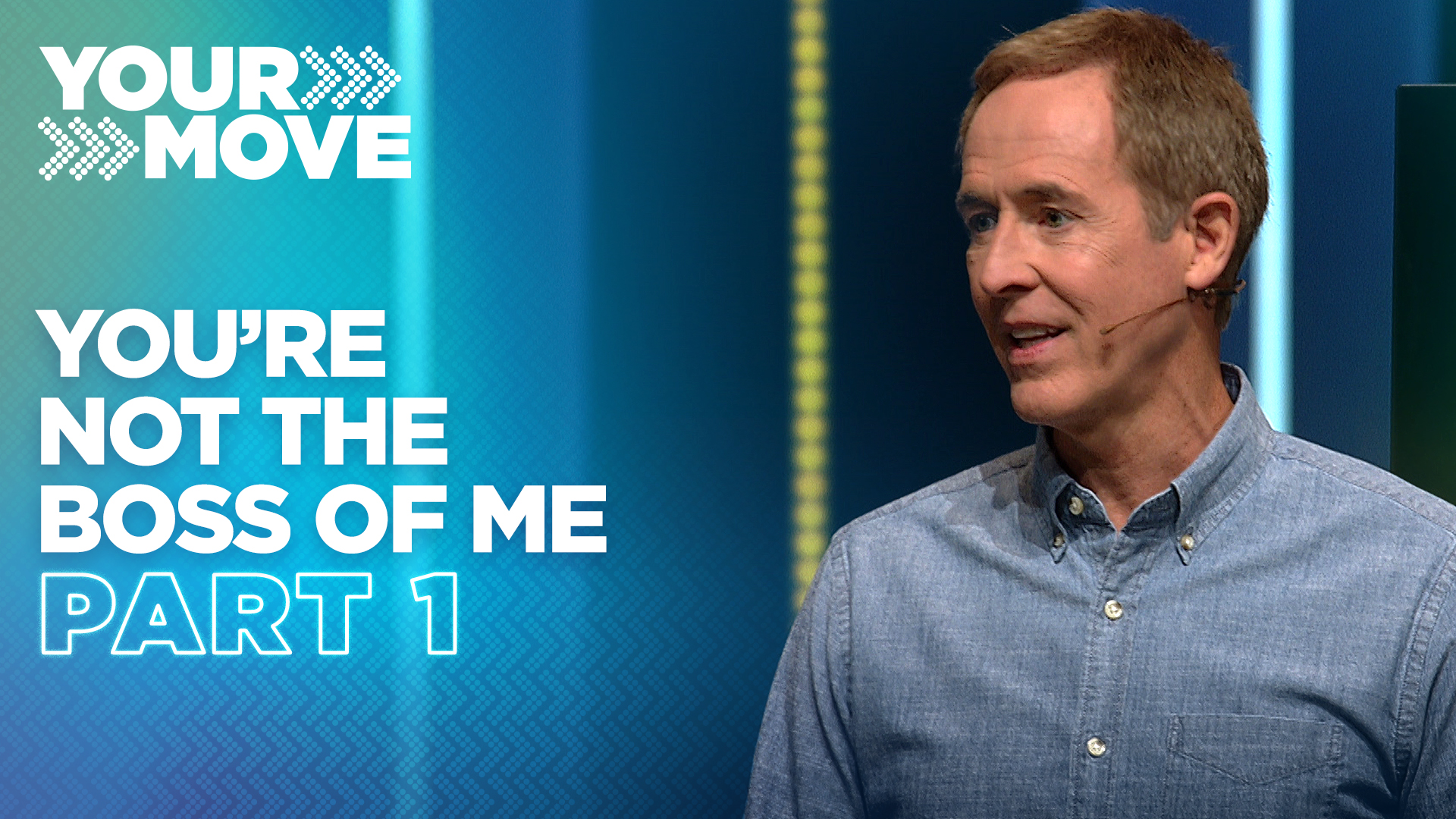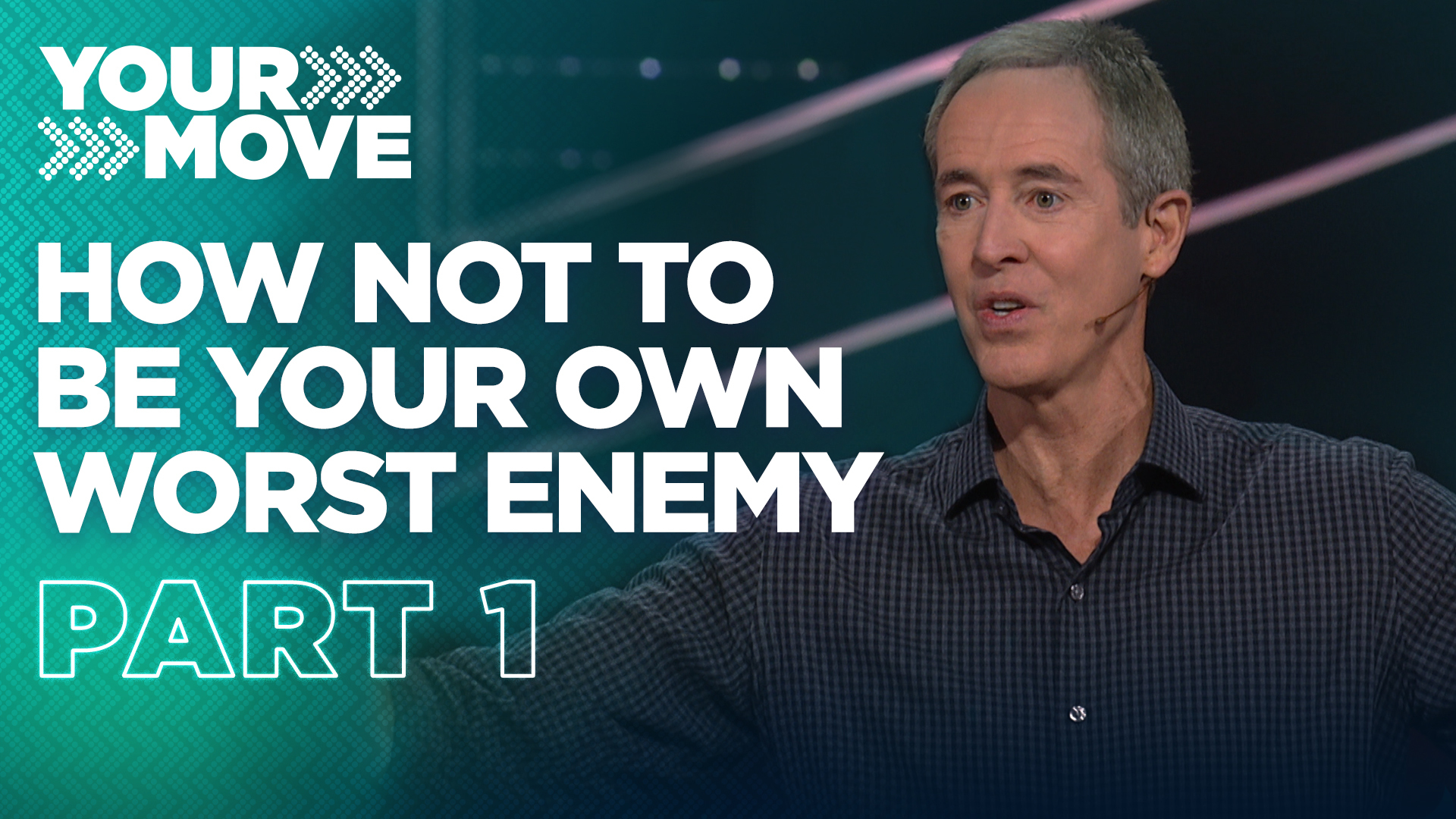In romantic relationships, we all want to avoid unnecessary heartbreak. So how do we protect our most important relationships when we find ourselves veering into dangerous territory?
- How do you define “fidelity” or “faithfulness” in a romantic relationship?
- What comes to mind when you hear the word “sin”? Does Andy’s definition (“hurting, stealing from, or dishonoring someone”) differ from your understanding of sin?
- Andy mentioned that culture baits us to the edge of disaster and then shames us when we step over certain lines. Have you found this to be true? Explain.
- With whom could you discuss potential areas for sexual guardrails?
- What relationship would a guardrail protect?
- Who can keep you accountable when you’re tempted to step over the guardrail?
NOTE: The following content is a raw transcript and has not been edited for grammar, punctuation, or word usage.
Now, the reason we call this series Guardrails, if you’ve been here you know this, is because the highway isn’t the only place we need guardrails. Our greatest regrets, I would bet for most of us, our greatest regrets would have and could have been avoided if we’d had some financial guardrails, some relational guardrails, some moral guardrails, some academic guardrails, maybe even some professional guardrails.
And when we talk about a guardrail in this context, it’s basically a personal rule. It’s kind of a personal law. It’s something that I decide for me. I don’t decide for you, because I don’t have any right to tell you how to live your life. But a guardrail is something I establish for myself and it’s essentially a standard of behavior that becomes a matter of conscience. A standard of behavior that becomes a matter of conscience. I decide that for me financially, for me professionally, for me when it comes to friends and neighbors and relationships, when it comes to my marriage, for me personally, I have a certain standard I wanna live by. And when I begin to drift toward that, the edge of that standard, when I begin to drift out of bounds it lights up my conscience. In fact, that’s the point of a guardrail. A guardrail, the point of a guardrail, is to light up our conscience before we hurt ourselves and before we hurt someone else.
The point of a guardrail is to make us feel a little bit uneasy on the inside and to make us feel uneasy early. That’s what a guardrail is. It’s a personal standard of behavior that we commit to personally, individually. We don’t give other people guardrails, we establish them for ourselves to keep us on the road, to keep us out of the danger zone. Again whether it’s relationally, financially or whatever it might be. But the thing is, and thing that makes this so hard is that the culture we live in does not celebrate and does not encourage guardrails. The culture that we live in, the world we live in, and it’s always been this way, celebrates and magnifies and decides that basically all we really need are painted lines. And that is especially true when it comes to the topic that we’re gonna talk about today.
Last week, we talked about friends and associates. Today, I wanna talk about friends with benefits. Okay? Today, I wanna talk about moral guardrails. I wanna talk about guarding your marriage. Guarding yourself for marriage and guarding yourself from married people, okay? How, the word, the best word to describe this whole topic is the word that we never ever use very much, and this word, it’s the word ‘fidelity’. Comes from a Latin word that means faithful or loyal. What I wanna talk about today is how to protect you and your relationships with your significant other, and how to set up some standards, some things that ding your conscience to guard you in what is perhaps your most important relationship. And today, I’ll be your guide.
Now, nowhere, nowhere in culture, nowhere in culture, nowhere does culture do a better job in baiting us towards the edge and then chastising us and shaming us when we step over certain lines, that when it comes to this area, when it comes to moral boundaries, or fidelity or faithfulness to our husbands, or wives or fiances or whoever it is that’s in your life. But the problem is, and the hypocrisy in all of this, the problem is, there is a sense in which we are all complicit. That we are all part of the problem, because you entertain yourself, let’s just be honest, no elbows and no looking around. You entertain yourself with media, movies and music that glorify sex outside of marriage and glorify affairs. This is just part of the themes of most of the books that you read perhaps, unless it’s a self help book, the movies that you watch, the videos that you watch, the things that you binge-watch on. And it’s funny, and we entertain ourselves with it.
And then what happens? Then a friend actually has an affair and we’re mortified. We’re just disgusted, “I can’t believe your husband would do it.” “I can’t believe your wife would do that.” “I can’t believe your sister-in law would do that.” And we entertain ourselves with it and then we freak out when somebody actually does it. We say things like this, you hear this all the time. “Boys will be boys. Boys will be boys” I love what Ann Voskamp says, even though it’s very heavy. She says this, “When boys will be boys, girls will be garbage. When boys will be boys, girls will be garbage.” And on one hand, it’s funny and they say, “Boys will be boys,” but when girls are mistreated, when women are mistreated, we freak out as we should but we’re a bit complicit in this whole thing that on one hand we celebrate it, we sing about it, we entertain ourselves with it then we freak out when somebody actually does it.
That’s why I said, in this particular area, this is the area where culture does more to bait us to the edge of disaster and then shame us when we actually step across certain lines. But here’s the thing, and I know this is unrealistic, but that’s okay. If we could get this one thing right. If we could just get this one thing right as a community, or whatever community you’re in. If we could get this one thing right as a city. If we could get this one thing right as a state or a nation, it would change everything. There would be less poverty. There would be fewer unwanted pregnancies. There would be less domestic violence. There would be fewer kids in the foster care system. There were be fewer little boys and little girls who grow up in homes without a mom and without a dad. And come on, let’s be honest. All of us know. All of us know someone, or all of us are someone, or all of us will raise someone, whose life would be completely different if they had established guardrails in the area that we’re talking about today.
But imagine this, with everything I’ve said so far, and this isn’t a religious thing yet, this is just a thing-thing, right? Based on your experience or my experience, based on your growing up experience. Wouldn’t it be amazing if we could get this right? You know this would make an extraordinary difference. If you were God and you were going to inspire someone to write on this topic, what would you inspire them to say? “Go for it? Have a good time? Wait till you’re ready? Drink responsibly and have sex responsibly?” If you were gonna give the world a message as it relates to sexuality and sex, what do you think God would say? What do you think God, who has invited you, think about this, God who has invited you to address Him and relate to Him as a heavenly, got your best interest in mind, father?
So 2000 years ago, which is amazing when we look at the complexity of this text, 2000 years ago, the Apostle Paul, who was planting little churches all around the Mediterranean Basin, writes to a church in Corinth. He’d already been there visiting, in fact he’d been there a couple times maybe, so he’s taught everything that we’re about to read and then he writes them a letter to remind them of what he taught when he was actually with them. And here’s what he says, “Flee from sexual immorality. Flee from sexual immorality.” In other words, before you freak out about this, this is exactly what every husband wants his wife to do. This is what every wife wants her husband to do. This is what every fiance wants their fiance to do. This is what every big brother wants his little sister to do. This is what everyone who cares about someone, and loves someone, wants them to do. That when it comes to sexuality, they want them to at least be very, very, very careful, and there are some things you want them, and we want them to flee from.
But we are in a culture, and we are in a world and sometimes we’re complicit in setting ourselves up not to flee from, but to flirt with. And again we become hypocrites, and again we bait ourselves and allow ourselves to be baited to the edge of disaster then we step off and we feel shame. Or other people step off and we condemn them. And so the Apostle Paul, under the inspiration of the Holy Spirit has this insight that is mind blowing not because it’s so unusual, because we immediately latch onto it, what’s so mind blowing about it is that he knew this 2000 years ago.
Here’s what he says, he says, all talking about sexual immorality, “All other sins.” And Paul immediately puts sexual sin in a category all of its own. That it is uniquely, he knew this, it is uniquely damaging. It’s possible to fully recover financially. It’s possible to fully recover academically. It’s possible to fully recover financially. But when it comes to sexual sin, it’s not the case. Forgiven? Absolutely. Fully escape the consequences? Never. The damage is done. And often time, come on you know this, often times it’s generational damage. It undermines future intimacy. It impacts future relationships. It has a way of continuing to resurface in area after area, after area.
And then there’s this, in case you’re pushing back, come on let’s be honest, sexual sin and I’m gonna define it just a second. But sexual sin will make you a liar and a secret keeper for life, unlike anything else. You’ll admit your past bankruptcy, you’ll admit, “Yeah when I was 20, 22, 23, back then I got a DUI, just wanna get that out on the table. You’ll admit all kinds of things, sexual sin will make you a liar and secret keeper for life, some of the most broken-hearted people are the people I know who got married and their husband or their wife told them part of their sexual history. And in telling part of their sexual history, they relieved their conscious but they didn’t tell the whole story and they stood at an alter and they made a promise forever and forever and forever and you’re the most important person in the world to me but I’ve got a secret and I’m too ashamed to tell you the secret because of what you might think about me. Sexual sin will make you a liar and a secret keeper for life.
And so the Apostle Paul, it’s amazing he knew this, 2,000 years ago he said, “Look, this is not unforgivable. This has nothing to do with God accepting you and loving you. I’m just telling you the consequences of sin in this particular arena are different than every single other area.” And you know what? You know that and I know that, and we don’t have to look far to understand that, that somehow we’re all able and everyone is able to move on beyond just about anything else but things that had happened to a person sexually or that a person participates in sexually, for some reason, it follows us and follows them around, oftentimes, their whole life. And again, it’s not a forgiveness issue, it’s the nature of sexuality. Here’s what he says, “Flee from sexual immorality, all other sins of person commits are outside the body but the person who sins sexually.” And I wanna come back to that in a minute, “The person who sins sexually sins against their own body.”
Now, what does sin sexually even mean? This is really, really important sin sexually, what does that mean? In the New Testament, sin is always defined by hurting, stealing from, or dishonoring another person. That’s what sin is. It’s hurting, stealing from, or dishonoring another person. That anytime I put me before you to your detriment, that’s a sin. Here’s why.
Because every single person you ever have the potential to hurt is loved by God. And see, I’ve told you this before, you cannot be okay with me if you mistreat one of my children. And anytime you steal from, hurt, or take from another person you have offended your heavenly father not because He has such a low tolerance for pain, but because He loves the person you offended or hurt or stole from.
And so for Christians, now this is for everybody but for Christians, our standard of living is what we call the platinum rule, the golden rule, “Do unto others as you would have people do unto you.” But the platinum rule is different, the platinum rule is, “I am to treat you the way God through Christ has treated me. And if you’re a Christian, you’re to treat me and the people around you the way that God through Christ has treated you.” Sexual sin is anytime you do something to potentially hurt another person that makes it a sin not, because, again, that God is squeamish, but because God loves the people you potentially hurt and God loves you. And God doesn’t want you to hurt you. [chuckle]
Here’s the thing, come on. When you take from someone something that was intended for or promised to someone else, you sin against that person. That’s what sexual sin is. It has everything to do with how much God loves you and honors you and cherishes you and honors and loves and cherishes the person beside you, and the person behind you, and the people that you work with and do life with.
That’s why this is a big deal, that’s why it’s a big deal to God because the consequence of sexual sin is so different and God loves you too much to keep His mouth shut. And He says this, “Whoever sins sexually actually sins against their own body.” Paul says, “Come on, when you sin sexually, not only do you steal from her or take from another person, you hurt yourself, you betray yourself, you undermine your own potential for future intimacy.” Paul says, “This isn’t a category of one, this is a whole different thing, this is precious, it’s fragile, it’s powerful and you need to guard it. And so he says this, “Do you not know? Do you not know?” In other words, there’s something you may not know that if you knew it would impact your behavior. And here’s what he says and he’s speaking to Christians, if you are not a Christian, you’re not accountable for any of these but this is kind of fascinating if you ever become a Christian, this may become important. But for those of you who are Christians, and Paul is writing to Christians, here’s what he says, he says, “Do you not know that your bodies,” your physical bodies, “are temples?” Your bodies, every single person’s body “is a temple of the Holy Spirit who is in you, whom you have received from God.”
And now Paul, this is so brilliant, he shifts the conversation away from consequence to identity. Essentially he’s saying this, “Do you not know? Do you not know? Do you not know who you are? Do you not know what you are? You are a temple.” And we go, “So what, what’s a temple?” Most of us the only time we’ve been in a temple was a tourist attraction somewhere, right? And plus temples are sacred and in our culture nothing is sacred. To which Paul would say, “Aah, but you are.” In fact, you are more sacred than the most sacred sight anywhere on the planet because the Holy Spirit of God dwells in you. You are, whether you wanna be or not, whether you knew it or not, you are a sacred image bearer. You are fine and you are fine-tuned for a relationship with God and a relationship with others. That you didn’t just happen. You were designed. You were designed and fine-tuned for intimacy with one other person. You’re no mere mammal and neither is the person that you live with, and neither are the people that you work with, and neither are the people that you are sitting beside. That God’s spirit resides in you. And you know why that’s a big deal? Because the value of a container is determined by what it contains.
See if you stole my wallet, I wouldn’t be concerned about my wallet. I would be concerned about what? What’s in my wallet. My wallet isn’t valuable it’s what’s in it and this is true of everything. It’s what a container contains that makes it valuable. And your heavenly father says, “You contain the image of God.” You are extraordinarily, extraordinarily valuable and so is every single person you were ever eyeball to eyeball with. He says this, “You’re not your own, you’re not your own.” To which we say, “Yes I am, I’m an adult, I’m a senior in high school, I’m a free agent, it’s my body I can do whatever I want to.” Paul says, “No, no, you’re not you own.” And be glad you’re not your own because ownership determines value as well. The thing that makes a container valuable is what it contains but ownership determines value as well.
In fact, you may have remembered this story a couple of years ago, a 2014 Stratocaster guitar that was worth maybe $1,800 retail, a used Stratocaster guitar worth about $1,800. 2014, in 2016 it was sold for over $45,000. Now, why would someone buy a guitar worth $1800, why would they spend $45,000 on it? Because of who owned it before. Because it had the signature of Eric Clapton. And when Eric Clapton, the owner, made it known, “This is my guitar,” the value sky-rocketed. And do you know what Paul is saying, this is so powerful, “That you are owned by your Father in heaven, which gives you extraordinary, extraordinary value.” That you are not on your own; you were actually purchased with a price, “How much?” Hey the value of a thing is determined by what it’ll bring. The value of a thing is determined by what… You can put any kind of price tag on anything you want, but the value of a thing is determined by what it’ll bring. And Paul said that the essence of the Gospel is, that when God sent His son into this world to die for your sins, that meant that’s how valuable you are to God.
“Therefore,” he says, “Therefore, in light of the selfishness of sexual sin, in light of your extraordinary value and your fine-tuned potential for intimacy, in light of all that,” he says, “Therefore,” here’s the application, “Honor God with your bodies. Honor God with your bodies.” This is the New Testament sexual ethic, “Honor God with your bodies.” Honor God with your bodies and honor the other bodies around you because they are so valuable to your Father in Heaven. That’s why this is a big deal. It’s not just consequence, we know the consequence, it’s because those of us who believe there’s a God in heaven believe every single person bears the image of God and deserves our utmost respect. Not because of their behavior but because whose image they bear. Now if you’re listening to this going, “Oh I didn’t know that.” That’s why Paul said, “Do you not know, because you did not know and now you know.” [laughter] What if you saw every person around you that way? What if you saw in them what Paul says is in them? It would impact the way that you treat them. But fleeing. Fleeing immorality requires guardrails. This just doesn’t happen, because again everything in culture mitigates against us.
Here’s what I wanna do for the next few minutes just to bother you, I want to make some suggestions as it relates to moral guardrails. How to protect your fidelity if you’re in a relationship or you wanna be in a relationship or maybe you just got out of a relationship. I wanna talk about how to do this, but here’s what I want to say ahead of time, if you hate my suggestions, if you think those suggestions are so narrow-minded and Andy you’re so old, or if you think they’re just from some other world or some other generation that’s okay, you can ignore the next seven minutes. All I ask is this, that when I’m done and when you’re done being upset with me and frustrated with me that you sit down and establish guardrails in this area of your life.
Here’s some suggestions. The first one is, talk about it. If you’re married or you’re engaged or you’re dating somebody and it’s a serious relationship, you need to talk about this. And here’s what I mean. You need to talk about what you’re comfortable with as it relates to your fiance, your husband, your wife, your partner’s relationship with other men and with other women. You need to decide together. You need to know what she thinks and she needs to know what you think. You need to know what he thinks and he needs to know what you think. That you should decide together what is appropriate behavior in the office. What is appropriate behavior in terms of the workday world and friends, you just need to talk about it. You should, and I feel strongly about this, that you should avoid traveling or eating alone with potentially problematic people. And you say who are the problematic people? You know, you already know, I don’t have to define them for you, you know who the potentially problematic people are. It’s because when you get to the office, you can go left or right and you always go left ’cause he’s right there on the left, that’s a problematic person.
You know who the problematic people are, you need to decide as a matter of conscience, “You know what she kinda gets to me, he kinda gets to me, she keeps coming over to visit me, he keeps coming around me.” You know who the problematic people are and you should make a guardrail that you are going to avoid traveling alone with, or eating alone with those people. I embraced that years ago when I was first married, I decided that’s gonna be a standard, a guardrail for me.
I realized that that is not practical for everybody because of who you work with, the kind of business that you’re in, who your boss is and what’s required of you. The point is simply this, we know the environments that create intimacy between people. I don’t have to explain that to you, you know that. If you’re in a committed relationship, and if you’re, especially if you’re married, you should talk to your spouse, you should talk to your fiance about the problematic people, and you should have this discussion and you should establish guardrails. Now, if you have to, I mean there’s times when you just, “You know what, that’s my boss, my boss takes me to lunch, my bo… We travel.” Then the second thing I suggest is you tell ‘em about it. Tell ‘em about it, always, never keep… You don’t ever need to keep a secret in an important relationship and when you find yourself thinking about keeping a secret that should set off your conscience.
When you find yourself hesitating to tell because you know what, we traveled together the last three times, this is the fourth time I’m not sure I want her to know, I’m not sure I want him to know because after that third time, we had that conversation if she finds out I’m doing… Any time there’s something in you that hesitates being honest about your relationship with another person, that should set off red flags in your heart, your mind. That’s a guardrail. That sets off something in your conscience you haven’t done anything wrong, you haven’t done anything bad, it’s minimal damage but you need to pay attention. You need to be honest with yourself and you need to be honest with your spouse or your fiance or the person that you’re thinking about committing your life to.
Don’t get involved in counseling relationships with people that are potentially problematic, people that you could be attracted to or they could be attracted to you. Just don’t get into counseling situations besides, you’re not a counselor. In fact, you don’t even give good advice okay? [laughter] Just don’t do that, and here’s the thing. They need help, this is important, they may need help, they don’t need you. They may need help, get them help.
Now, here’s another one. This is kind of strange but you’ll understand. When you feel your heart, when you feel your heart and your desire drifting toward a specific person that’s really an out-of-bounds person, you need to tell somebody. When you know that your heart and your attention and your mind and your lust is drifting toward a person that’s out of bounds because you’re in a relationship, you need, you may not wanna tell your husband or your wife initially, but you’ve got to tell somebody and here’s why; because oftentimes, speaking of it diffuses it. Speaking of it diffuses it, and secrets are never healthy to carry around. Now, the objection, and I totally get this, the objection is “Andy, but doesn’t some of this limit a woman’s professional opportunities?” And the answer is “it certainly can.” If misapplied, absolutely, it certainly can. In fact, I got a letter last week from a woman who went from a for-profit company to a non-profit company, and then non-profit company, all the men in the company had the Billy Graham Rule and she didn’t get invited to lunch, she didn’t get invited to meetings, and she felt like her whole career was side-tracked and sidelined, because she didn’t have access to the people who could help her move up in the organization the way that the men could. That’s a terrible application of this idea.
All of us in positions of authority, starting with me, including me, all of us in positions of authority need to make sure that these kinds of guardrails don’t impede upward mobility for anybody, but especially women in our organization. I got a letter after the first week that said, “Andy, these rules and these standards and these silly guardrails,” they didn’t say silly. “These guardrails,” I think she was thinking ‘silly guardrails’. “These guardrails make it sound like women are predators.” I wanna just be super clear. Men are predators, women aren’t predators okay. And when properly applied, when properly applied, this actually creates a healthier environment for women in the workplace. It actually protects women. And in case I haven’t made it clear, in my… Through the years as I have talked to many people who’ve embraced these kinds of ideas, I’ve talked to as many women as men who’ve said, “No, that’s the standard I’ve set for myself, my husband and I talked about it, and we both, this is how we live our lives. And when there’s an exception, we call each, let each other know.”
This isn’t a guy-only thing, this is a thing-only thing. This is about asking the question, what is the best thing? What is the wisest thing to do to protect my fidelity? The other issue and the other area of course is social media. Come on, when it comes to affairs, and illicit relationships, and emotional involvement, social media is a gateway drug. You know that right? In fact, in some ways, social media is worse than actually meeting with someone privately for dinner or for coffee, because with social media, you know how this goes, you just begin to idealize that person because you’re only getting the highlight reels. Then you begin to fantasize about that person, then you begin to romanticize the relationship, and you haven’t even talked, you haven’t even had any kind of physical contact. By the time you do, everything is so amped up, everything is so unrealistic. All of those areas where you need to have guardrails. If you are married, again or in a significant relationship, you need to talk about all of this because the point of it is this, the point of a guardrail is to light up our conscience before we hurt ourselves and before we hurt other people. A guardrail should light up our conscience, in other words, it should make us sensitive to something not because we’ve done something, but because we are drifting in a direction.
Now, if all of this seems so extreme, I just want you to remember this, come on, you’re an adult, you know this. Dangerous environments right, dangerous environments call for extreme measures. You say, “Well, Andy, is it really all that dangerous?” Let me ask you a question then I’m done. Married couples, married and engaged couples real quick, I just wanna ask you. Married and engaged couples, what in our culture, what in our culture equips you and supports you when it comes to remaining faithful? Advertising? No. Media? No. Television? No. Books? No, unless you’re reading a book about marriage. Singles, same question. Who and what? Who and What? Who and what encourages you and equips you to live responsibly when it comes to your sexuality? Where in society are there people just saying, “I just wanna breath life into you, I wanna speak truth to you, I wanna make sure that if you ever get married you’re gonna be so equipped and you’re… Who’s doing that for you? That’s why I say, it’s a dangerous environment, it requires extreme measures. And come on, do you think, we’re adult, right? Do you think that you’ll look back in five years and regret establishing guardrails around your fidelity? Do you think five years from now you’ll look back and go, “Oh, those stupid guardrails, I got into so much trouble, I have so many regrets spending all that money.” No. If you establish guardrails now, five years later you’ll look back and think it’s one of the best decisions you ever made. So you gotta decide, flee or flirt. Flee honors God. Flee honors you. Flee honors your kids, your future kids, your grandkids, and flee honors others, but flee requires guardrails.
We just set some guardrails that ding your conscience while you’re still in the safety zone. You won’t be applauded now, but you will be applauded later because guardrails will become part of the story that you get to tell. And you’ll be applauded later by the people that actually matter most and by your Father in Heaven. Think about it. Talk about it and do something about it. You already wish you had. You’ll be glad that you did, and besides, guardrails, guardrails set you up to say from the bottom of your heart, “I’m forever yours, faithfully”. I thought that was kind of cute, okay.
[laughter]














